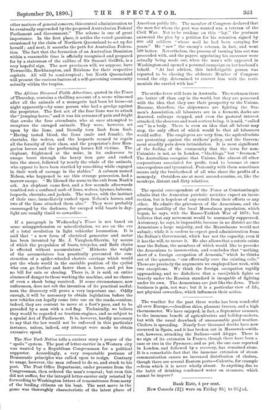The special correspondent of the Times at Constantinople admits that
the Armenian patriotic societies expect an insur- rection, but is hopeless of any result from their efforts or any other. He admits the grievances of the Armenians, and the growing hostility of the local Muss alman population, which began, he says, with the Russo-Turkish War of 1878; but believes that any movement would be summarily suppressed. Autonomy, he says, is impossible, because in no district are the Armenians a large majority, and the Mussulmans would not submit ; while it is useless to expect good administration from the Sultan's Government, which has not the capacity, even if it has the will, to secure it. He also allows that a coterie exists near the Sultan, the members of which would like to provoke the Armenians to insurrection, and concludes that "nothing short of a foreign occupation of Armenia," which he thinks out of the question, "can effectually cure the existing evils." These are precisely the arguments we employed last week, with two exceptions. We think the foreign occupation rapidly approaching, and we disbelieve that a racelwhich fights so bravely under the Russian standard is incapable of fighting under its own. The Armenians are just like the Jews. Their business is gain, not war; but it is a particular view of life, not physical cowardice, which influences their action.


































 Previous page
Previous page